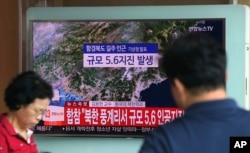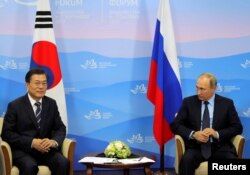U.S. President Donald Trump told British Prime Minister Theresa May that opening discussions with North Korea is not currently the best option to address the country's growing nuclear weapons program.
"Now is not the time to talk to North Korea," Trump was quoted as saying in a White House readout highlighting his Tuesday discussion with May.
Trump said, "All options remain open to defend the United States and its allies against North Korean aggression." The two leaders vowed to continue to increase "diplomatic and economic pressure" on North Korea, which test-detonated Sunday what was believed to be a hydrogen bomb.
Also Tuesday, Trump discussed North Korea's latest test with Australian Prime Minister Malcolm Turnbull. A White House statement said the two leaders agreed to "intensify joint efforts to denuclearize North Korea."
China
North Korea is also expected to be addressed Wednesday when Trump speaks with Xi Jinping, the president of China, North Korea's neighbor, main trading partner and strategic ally.
Trump has vowed to stop all U.S. trade with any country doing business with North Korea, and Treasury Secretary Steven Mnuchin says he is working on details of such a plan, which would primarily target China. More than 90 percent of North Korea’s export earnings come from China.
South Korea is planning to deploy additional launchers of a controversial U.S.-built missile defense system, a further sign of escalating tensions and a diplomatic stalemate over North Korea's growing nuclear weapons program.
Additional THAAD launchers
The Defense Ministry announced Wednesday that four more rocket launchers that make up the Terminal High-Altitude Area Defense system will be installed along with the two launchers that are already in operation at a former golf course in the city of Seongju, located south of Seoul. The deployment of the THAAD system is bitterly opposed by China and Russia, which view the powerful radar-based system as a threat.
The announcement came on the same day U.S. Defense Secretary James Mattis spoke with his South Korean counterpart, Song Young-moo. The Defense Department said Mattis told Song the U.S. remains "ironclad" in its commitment to defend South Korea and promised a "massive, effective, and overwhelming military response" if South Korea and other U.S. allies are threatened.
The additional THAAD launchers are being deployed just days after Trump and his South Korean counterpart, Moon Jae-in, reached an agreement to lift payload restrictions on South Korean missiles, in response to Pyongyang's latest nuclear test on Sunday.
Along with bolstering its military, President Moon explored a diplomatic solution to the standoff Wednesday during talks with Russian President Vladimir Putin on the sidelines of an economic summit in Vladivostok.
Both leaders agreed that North Korea must end its nuclear and missile testing programs, but Putin once again rejected imposing further sanctions on the isolated regime, maintaining that negotiations are the only means to resolve the issue. The South Korean leader urged his Russian counterpart to consider blocking oil shipments to the North, as well as preventing North Koreans from working in other countries.
China also contends that further tightening sanctions against Pyongyang will do little to ease tensions on the Korean peninsula.
The United States this week is circulating a draft of a new resolution about North Korea at the United Nations, hoping for a Security Council vote next Monday.










